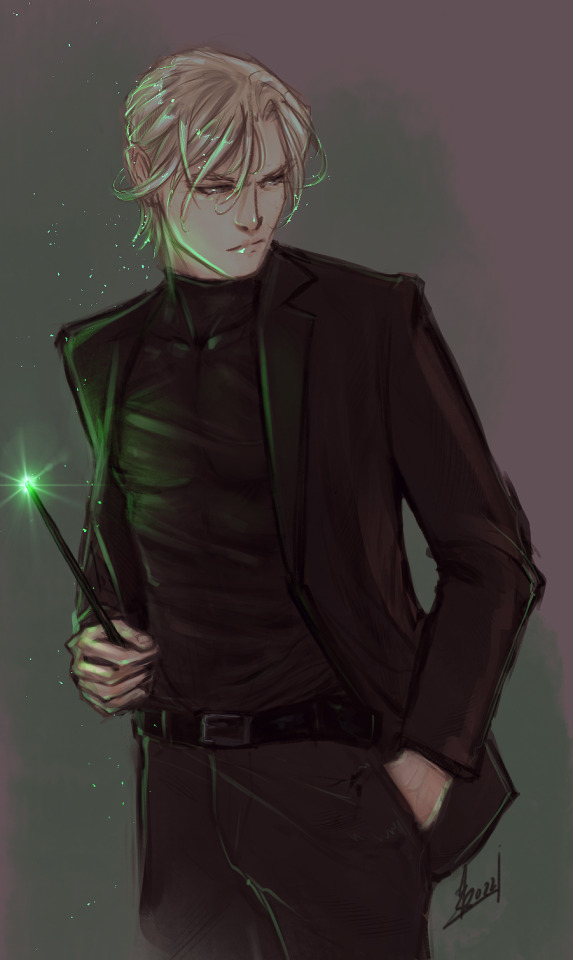Text
Harry when bad things happen to Death Eaters who are chasing him: unfortunate but they brought it on themselves
Harry when there are casualties during the Gringotts break in: I wish it didn't have to be this way but the mission comes first
Harry when Draco is in danger: HORCRUX WHOM?? THIS IS A RESCUE MISSION NOW.
5 notes
·
View notes
Text
Andromeda: I need to tell you something. I've fallen in love with someone and his identity will shock you.
Alphard: You're talking to the man who dated Tom Riddle. Nothing can shock me at this point.
Andromeda: I have no idea who that is but ok.
#Alphard: You wouldn't believe me if I told you.#crack#Tom Riddle/Alphard Black#humor#Harry Potter#andromeda black#Alphard Black#Tom Riddle#alphard black/tom riddle#Alphalord#andromeda black/ted tonks#Andromeda Tonks#random musings
2 notes
·
View notes
Text
I don’t think it’s mentioned enough when criticizing Dumbles that he’s awfully arrogant. He covers it up with courteous modesty, but he thinks he’s the best in the room, and he lets people think that. In his adulthood he never once considered anyone his equal, and he actively tears Tom Riddle down because he refuses to view Tom as so. He needs to have others believe he knows more than Voldemort. He always has to emphasize Voldemort’s weak points, and never acknowledges his own. And he uses this horrible demoralizing tactic of acting like he’s perfectly calm and above it all. He pretends to be humble but he isn’t. He really isn’t.
23 notes
·
View notes
Text
Not to mention he presumably got an O in potions and was able to conjure a serpent on his first try in second year. And he was able to block a non verbal Levicorpus from Harry in 6th year.
it's actually mad impressive that draco's ‘potter stinks’ badges still worked years later. most charms that we see like that in the books wear off after a few hours or a few days at most.
80 notes
·
View notes
Text
Tom Riddle's upbringing means that he must've been constantly surrounded by the ever-present fear of death from a very young age. He was born in an orphanage in 1926. He must've grown up surrounded by illness and disease. Sickness must've frequently swept the orphanage and he probably saw other children dying all the time. Of course, these Muggle disease couldn't have killed him but he didn't know that. He would've spent a lot of time wondering if he might be next.
And then came World War II and the bombings. How many summers did he spend wondering if at any moment his life might be snuffed out in an instant? I wonder if that's partly why he made his first Horcrux so young rather than waiting and researching it further - because he thought there was a real risk that he could be killed in an attack.
Not to mention that he had hardly endeared himself to the other people at his orphanage. And once he started at school he was no longer allowed to use magic out in the Muggle world as he had been doing so he would've been virtually defenseless if anyone chose to exact revenge or harm him for any other reason unless he wanted to risk expulsion or jail.
48 notes
·
View notes
Text
When Harry witnesses Draco being forced to torture Rowle, he is extremely upset. Much more so than he typically is about these visions. There are a lot of very drarry implications. Let's break it down.
"Malfoy’s gaunt, petrified face seemed branded on the inside of his eyes. Harry felt sickened by what he had seen, by the use to which Draco was now being put by Voldemort.”
Notable points from this passage:
1) Harry understands Draco so well that he immediately takes for granted that he doesn't want to be using the Cruciatus curse. It never even crosses his mind to take this as evidence that Draco is now a willing torturer who enjoys cruelty or that he deserves to be in this situation for having chosen the wrong side and for his role in Dumbledore's death.
Nor does Harry think Draco is just scared and upset because he's afraid Voldemort might lash out at him too - which is what Harry would think if he saw any other Death Eater acting afraid around Voldemort. He clearly sees that Draco is horrified by the acts he is being forced to commit. And he also completely accepts that it is Voldemort forcing Draco to commit these acts, thus absolving Draco of responsibility.
2) Harry is DEEPLY upset by seeing Draco in this position. More upset than he ever is about seeing any other Death Eater being terrorized or hurt by Voldemort (Harry doesn't even spare one thought for Rowle for example!) Not only that. He's also more upset than he is about seeing Ollivander tortured. Or about seeing Voldemort murder a woman and her children later on while searching for information about Gregorovitch. He finds those visions alarming but he shakes them off pretty quickly.
The only comparable strong reactions are how he responds to his visions of Arthur Weasley and Sirius in book 5 - i.e. visions of people he knows and cares about in danger and suffering. And it's not even the scene as a whole that upsets him. It's specifically Draco - whose frightened face seems "branded" on the inside of Harry's eyes. Harry can't get the vision out of his head, feels sickened, and fights to keep his voice casual afterward. Even though Draco wasn't even actively being hurt.
So canonically Draco matters to Harry in a way that almost all other people don't. It's not generic nobility that gives Harry sympathy even for an enemy - because he doesn't feel this way about other Death Eaters. And it's not general pity that Harry would feel for any innocent hurt by Voldemort - because he doesn't feel that way about victims like Ollivander or the children Voldemort killed. It's the type of reaction Harry ONLY has to people he deeply cares about suffering or being in danger. Harry may not think of it that way on an intellectual level. But his heart knows it even if his brain doesn't. He cares about Draco Malfoy. A lot. He cares about him more than he cares about almost anyone else.
3) Also notable. Harry starts out referring to him as Malfoy but then switches to thinking of him as Draco as he starts worrying about him. (Yes. The drarry trope of Harry switching from "Malfoy" to "Draco" literally happens. IN CANON.) And he keeps thinking of him as Draco after that point. The next time Draco is referred to is during the whole sequence where the Golden Trio are prisoners at the Manor. Harry refers to Lucius by his full name multiple times, but consistently refers to Draco as "Draco" rather than "Malfoy" in his internal narration.
4) (Also the fact that Draco's face is described as "gaunt" hits me right in the feels. It seems that he's in worse shape even than he was when Harry last saw him at the end of 6th year. Sad but not surprising given the guilt that is probably eating at him over his role in Dumbledore's death, what he is now being forced to do as a Death Eater, and the very tangible dangers and suffering that come with being out of favor with Voldemort while having him in your house.)
Tldr: I don't need my ships to be canon but drarry is. jkr who? ;)
205 notes
·
View notes
Text
i go feral over the parallel of harry and draco both looking exactly like their fathers and seeming at first to be just like them in personality too but actually turning out to not be very similar at all in temperament or in the choices they make
44 notes
·
View notes
Text
Draco: We're surrounded. What are we going to do?
Harry: Don't worry. I have a plan.
Draco: It better not involve suicidal levels of self sacrifice.
Harry: ... I no longer have a plan.
Harry: Oh well. That's never stopped me before.
Draco: *facepalming* Why did I agree to be your partner?
Harry: You mean as an Auror or at home? ;)
Draco: Both!
81 notes
·
View notes
Text
maybe part of why tom doesn't like his first name even when he's in the orphanage is because he knows he's named after his father, but with such a common first name that's not much help in tracking him down and almost any random man named tom could be his father so every time he comes across one part of him has to wonder if this is the person who abandoned him and his mother to their fate. maybe that's what he means by his look of annoyance and his "there are a lot of toms" comment.
i don't think this was jkr's intent. but i think it's a reading that works well with the text and characterization. i think even before he knew his true identity tom was very curious about his father and also harbored a lot of anger towards him.
14 notes
·
View notes
Note
cursed thought: alphalord is an accurate shipname bc if you did that ship as an omegaverse au alphard would absolutely be the world's most overlooked alpha and tom would be the worlds least second gender stereotype conforming angriest omega.
The terrible thought has crossed my mind anon.
It has crossed my mind.
29 notes
·
View notes
Text
Today in "words mean things"
I know I said I would try to be more positive and concentrate on the meta that matters to me, but I can't with Twitter today when I've had to read from several people that "only one of the Thor films wasn't a flop."
Regardless of your personal feelings, they all made money back and Thor 2011 generally received good reviews, The Dark World was mixed but slightly favouring the positive side even then (guess which character was usually the reason for that!) Even L&T got positive reviews (though I personally haven't watched that one so can't comment further.)
So by no measure does any of that equal financial nor critical flop. At worst you can call the critical response to TDW lukewarm. It still made money. It was also made during the worst era for executive meddling at Marvel, which explains the uneven writing.
I swear the caping like its your full time job for Ragnarok like it's the only one that counts needs to be studied.
48 notes
·
View notes
Note
wait how bougie was Tom Riddle Sr.? How nice would his Manor have been? Was he like an actually Lord with a title and stuff?
thank you very much for the ask, anon!
in half-blood prince, dumbledore refers to tom riddle sr. as "the squire's son" - which allows us to state with certainty that he was a minor aristocrat.
however, the word minor is important here.
there are - historically - two levels of aristocracy in britain. the first are the peers of the realm - which refers to families which hold one or more of the titles of duke, marquess, earl, or viscount. these are the elite of the elite - these gradations of nobility were created in the middle ages as a way of distinguishing those who held the titles from other noblemen, usually because of a close relationship [often one of blood or marriage or both] to the king.
the titles are hereditary by male primogeniture, and the holders - while this is no longer the case - used to have political power [such as the right to sit in the house of lords], simply by virtue of their birth.
[this is why they're called "peers" - it refers to them historically being close in status to royalty, and therefore expected to serve as royal advisors.]
there is another class of peer - a baronet - whose title is similarly hereditary, but whose position doesn't come historically with the right to sit in the lords or advise the king by virtue of birth. [baronets may - of course - have been members of parliament, or royal advisors selected at the king's discretion, but this would be separate from their title. a duke, in contrast, could historically expect to request a meeting with the king simply because he was a duke.]
while some families have historically been ennobled at the king's discretion, access to any of these titles is pretty much restricted to the small group of families who've held them for centuries.
but below the peers of the realm, there is a second, more minor class of aristocracy, the landed gentry - of which a village squire is a textbook example.
historically, what is meant by "landed" is an ability to live off of the rental income of one's country holdings, which would be leased to tenant farmers. that is, they are landlords in the original sense of the term - lords of the land. this is what tom sr. tells us his family does in half-blood prince:
“It’s not ours,” said a young man’s voice. “Everything on the other side of the valley belongs to us, but that cottage belongs to an old tramp called Gaunt, and his children. The son’s quite mad, you should hear some of the stories they tell in the village - ”
what is also meant by "landed" is that the family in question is of the upper-classes, but that they are still "commoners" - which in this context doesn't imply a value judgement, but which is a socio-legal term which simply indicates that they don't hold an aristocratic title such as duke, earl etc.
[and gentry families certainly aren't common in terms of financial standing... the most famous member of this class in literature? fitzwilliam darcy, whose ten thousand a year is something like thirteen million quid in today's money...]
gentry families might be very old - they might have received their lands from the king in the middle ages as a reward for knightly service, and it's interesting to imagine generations of gaunts and riddles brought up alongside each other in little hangleton - or they might be comparatively newer - tom sr.'s great-grandfather [feasibly born c.1810] could have been a self-made victorian industrialist who bought the lands from the original holder and established himself as gentry.
by 1900, it was becoming much harder for the gentry to live on rental income alone, and many would also have had jobs. these would have been elite, and very frequently were in politics, the civil service, the military, or the law. tom sr's father - whom the films call thomas, so let's go with that - might, for example, have served as a high-ranking officer in the army [including during the first world war], be the local magistrate, or be the local member of parliament.
in terms of titles, thomas riddle would almost undoubtedly be sir thomas - and this is how it would be correct to address him. but this title would be a courtesy, and it wouldn't be hereditary unless the riddles were also baronets [which it's entirely plausible that they were].
which is to say, tom sr. would not have a title while his father was alive - although he would have the right to be referred to formally in writing as mr thomas riddle esq. [esquire]. the correct form of verbal address for anyone other than friends and family would be to call him mr riddle, although the riddles' servants would probably refer to him as mister tom.
tom jr. would not have a title while his father or grandfather was alive. if the riddles were baronets, he would technically inherit the title after he kills the rest of the male line... but given that tom sr. never acknowledged him and his existence was presumably unknown to the riddles' lawyers this wouldn't be something which happened in reality. the estate's executors clearly took control of the riddles' property, the land was portioned off and sold, and the house became a standalone property for sale.
the riddle house - which is a name used informally for it in little hangleton, it would have a different "proper" name - is described in canon in ways which show that it's a typical manor house, which means it would look something like this:
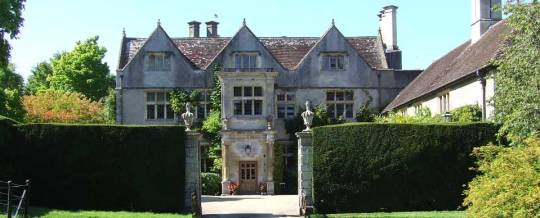
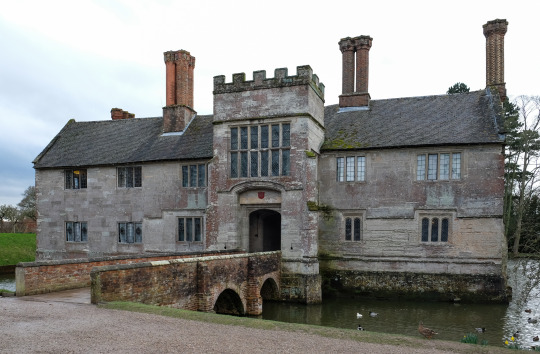
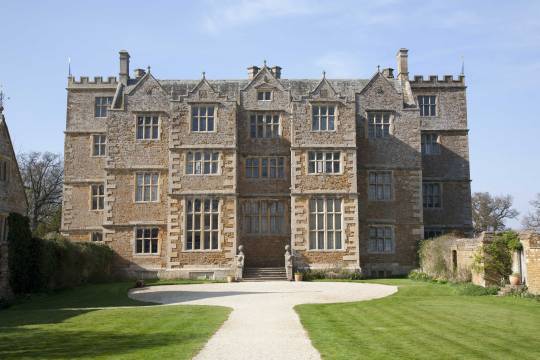
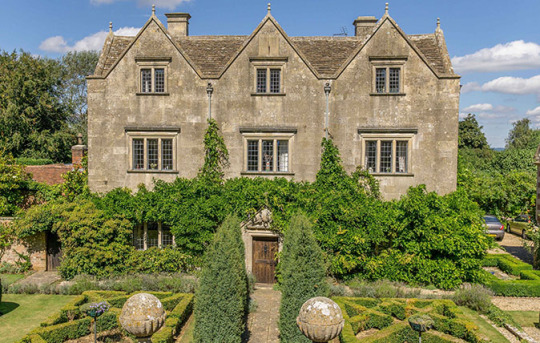
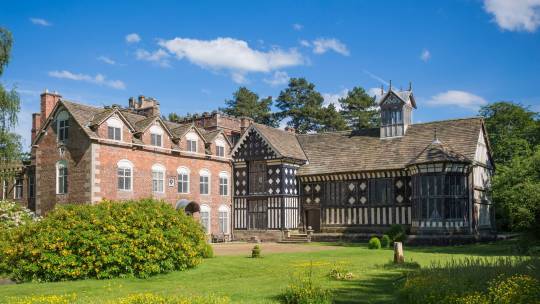
these houses are obviously very impressive, but they're tiny in size in comparison to the magnificent stately homes - places like blenheim palace, chatsworth, burghley house, holkham hall - lived in by the titled aristocracy. the riddles would entertain - for example - by giving house parties, dinner parties, hunting parties, etc., but they wouldn't have a ballroom or a dining hall capable of seating hundreds.
[they would probably also own a property - probably a flat or small house - in london.]
they would have servants, but not colossal numbers - they would undoubtedly have a butler but not footmen, and the upstairs maids would report to the butler since they probably wouldn't have a housekeeper. they canonically have a cook, who probably had one or two kitchen maids assisting, and they canonically have a gardener - frank bryce - who probably doesn't have any assistants. they may, depending on the size of the estate, have a gamekeeper. sir thomas undoubtedly had a secretary and a chauffeur, and his wife might have a lady's maid. tom sr. would have had a nanny and then been educated until at least the age of eight by a governess, but would then have attended a prep school [either day or boarding] until the age of thirteen, and then gone to a boarding school, from which he likely went on [on the basis of social class rather than talent] to oxford or cambridge.
the family would have enormous social influence locally. most people - and also businesses - in little hangleton would be their tenants, and they would also probably have a say over the appointment of the local clergyman [an important figure in the community in the nineteenth and early twentieth centuries], since the parish church is likely to have been something called a "living" - the thing which turns up again and again in jane austen - which means that the church and its parsonage technically belongs to the landowner, but is granted to the vicar as a freehold while he's in post.
gossip about the riddles' doings would also be the main source of local interest - the servants were dining out for months on tom sr.'s elopement and return.
so they're something resembling celebrities - but they're local celebrities. nobody in london - and even nobody in cities we can imagine are nearer to little hangleton, such as liverpool, would particularly know or care who they were. tom sr. might have made it into the london gossip columns if he was part of a particularly scandalous "set" [a group of friends] who socialised in the capital, but these mentions would have been fleeting - and the press would have been much more concerned by the doings of members of his set who were genuinely titled or who were legitimately famous.
[this is the reason why mrs cole doesn't recognise the name. if merope had said her son was to be named cecil beaton after his father, she may well have been prompted to hunt him down...]
so tom sr. is elite - but he's elite in a way which is extremely culturally-specific, and which is [just like the portrayal of aristocracy in the wizarding world - the blacks, for example, are far less aristocratic than the riddles in terms of canonical vibe] often exaggerated into the sort of pseudo-royal grand aristocracy which the british period-drama-industrial-complex makes such a big deal of.
and tom jr.'s character is affected by this in a series of extremely interesting ways.
by which i mean that, in terms of blood, he's probably the most aristocratic character in the series - the absence of grand aristocracy in the wizarding world would mean that [were he raised by his father] he would come from a social background which was equivalent [even as it was divided from them by virtue of being muggle] to any of his fellow slytherins, and would help him easily blend into their society because the manners, genre of socio-cultural reference points [he would recognise, for example, that quidditch heavily resembles both rugby and polo], accent and way of speaking etc. that he would possess would be broadly indistinguishable from those of his pureblood peers.
[this is why justin finch-fletchley and draco malfoy speak in essentially the same way.]
but he would then be given the enormous boost in cachet - one which would genuinely elevate him above the rest of cohort - of his maternal line.
and we see in canon that this does bestow some privilege on him among his peers while he's in school:
Tom Riddle merely smiled as the others laughed again. Harry noticed that he was by no means the eldest of the group of boys, but that they all seemed to look to him as their leader.
“I don’t know that politics would suit me, sir,” he said when the laughter had died away. “I don’t have the right kind of background, for one thing.”
A couple of the boys around him smirked at each other. Harry was sure they were enjoying a private joke, undoubtedly about what they knew, or suspected, regarding their gang leader’s famous ancestor.
where he's let down socially is that people like slughorn - to whom he can't reveal his slytherin ancestry and hope to maintain cover for his wrongdoing - don't think he's come from anywhere particularly special. this is because he has a muggle father - absolutely - but it's even more that he has a muggle father who, since he left him to be raised in an orphanage, was presumably working-class.
what the young voldemort lacks is any socio-cultural familiarity with the muggle class performance which the class performance of the wizarding world parallels. abraxas malfoy boasting about how important his father is would be something a tom jr. raised by the riddles could match - "oh yes, my father gives to all sorts of causes too. in fact, he was invited to buckingham palace because of it." - establishing himself as an equal in terms of class and social influence even if he isn't an equal in blood.
what actually happens in canon is that the orphaned tom - with his uncouth manners and his working-class accent - has no hope of gaining any sort of social equality with his posh peers.
so he becomes determined to outrank - and humiliate and control - them.
#fascinating and excellent meta!#Tom Riddle#Tom Riddle meta#Tom Riddle Sr#Harry Potter#Harry Potter meta#best meta#Tom Riddle g
60 notes
·
View notes
Text

ive gotten so much mileage out of this tweet. every time i see something on the internet that makes me mad i just think to myself "people in real life: hey man how's it going" and i keep it pushing
85K notes
·
View notes
Text
Harry: So I chose someone a little bit unusual to go to Slughorn's party with me but-
Ron: Oh no. Oh no. It's happening isn't it? It's actually happening.
Harry: What?
Ron: Is the person very blond?
Harry: Yes.
Ron: With silver eyes?
Harry: Yeah actually. How did you-
Ron: And do they idolize their father and repeat all of his crazy views as fact?
Harry: Yup! You've guessed it! Or did someone already tell you I'm going with- Ron? Are you alright?
Ron: I can't believe it. It happened. It actually happened. Hermione and I saw this coming but oh Merlin.
Harry: What's wrong with taking Luna?
Ron: Luna? .... Oh. Oh. LUNA. LUNA LOVEGOOD.
Harry: Obviously.
Ron: YOU'RE TAKING LUNA LOVEGOOD! THANK GOD!
Harry: ...Yes. Who did you think I meant?
Ron: Nevermind but wow you sure have a type huh?
862 notes
·
View notes
Text
'punch a nazi!!' how about we start small and you can name two jews who feel comfortable talking about judaism openly around you
3K notes
·
View notes
Text

Pensieve Mishap
Someone grabbed the wrong memory of Albus’ labeled “Gellert”.
2K notes
·
View notes
